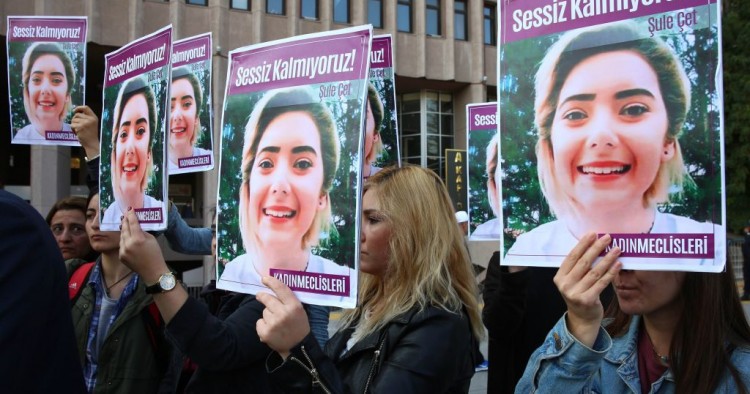Women in Turkey are subjected to violence regardless of socio-economic status. Unlike many countries around the world, laws are in place to prevent and combat violence against women. But sadly, when it comes to implementing these laws, failures leave women unprotected against male violence. The government’s patriarchal approach is one of the main barriers to the implementation of legislation already on the books.
In 2011, Turkey became the first country to sign and ratify the Council of Europe’s Convention on Preventing and Combating Violence against Women and Domestic Violence, known as “Istanbul Convention.” The convention criminalizes all forms of gender-based violence and the signatories are obliged to take necessary measures to prevent violence against women. In 2012, Turkey adopted “Law No. 6284 to Protect Family and Prevent Violence Against Women,” and the ruling Justice and Development Party (AKP) launched national action plans for gender equality. The Turkish system, however, continues to fail when it comes to protecting women due to a lack of political will.
“Women and men could not be treated equally. It is against nature,” said President Recep Tayyip Erdogan in 2014, accusing feminists of “rejecting motherhood.” Two years later he argued that women who are not mothers are “incomplete,” urging them not to use birth control and to have at least three children to ensure the growth of Turkey’s population. Erdogan’s sexist comments are no coincidence, and his anti-feminist, family-oriented rhetoric has a strong influence on legal practices and policy implementation. A de facto ban on abortion is an excellent example of this. Shortly after President Erdogan equated abortion with murder in 2012, the number of state hospitals providing abortion services dropped dramatically, leaving some women as well as health practitioners in doubt if abortion, legalized in 1983, was still legal or not.
The neoliberal economic policies of the AKP go hand in hand with religious conservatism, reinforcing socially constructed roles, equating womanhood with “sacred motherhood,” and maintaining the traditional Turkish family model. Conservative circles in Turkey, for instance, claim that laws promoting gender equality and providing protective mechanisms for women are tearing families apart. Thus, because of efforts to raise awareness among women about their human rights, the same circles are currently pushing the government to abolish both the “Istanbul Convention” and Law No. 6284, two major accomplishments of the women’s movement in Turkey.
The Turkish government’s efforts to prioritize the preservation of family unity are costing women their lives. Family-oriented policies emphasizing the role of women as “housewives” and “mothers” are expanding at the expense of women’s rights. Since the government perceives women’s empowerment as a threat to the unity of the family, and “the strength of a nation lies in the strength of families” as Erdogan puts it, the rights of women are ignored at the individual level.
Women’s empowerment has a dual impact on domestic violence. More and more women who achieve economic independence are exercising their rights and refusing to stay in abusive marriages or relationships. As Turkish feminist scholar Fatmagül Berktay argues, men are going through a “crisis of masculinity” due to the loss of their positions as breadwinners and “protectors” and “maintainers” of women. Accusing women of not being “obedient,” men are engaging in physical, sexual, psychological, or economic violence. In many cases of femicide in Turkey, the perpetrators are either ex-husbands or soon-to-be-ex partners. The Turkish government does not regularly release official statistics on femicide, but nearly every day the media reports at least one woman being killed by a man. Needless to say, the government’s reluctance to take a strong political stance on violence against women is encouraging male perpetrators.
Women’s participation in the labor force is still low. According to 2018 statistics from the Organisation for Economic Cooperation and Development (OECD), only 34.2 percent of women in Turkey work, by far the lowest of the 35 industrialized countries. In addition, gender segregation in the workplace remains a major issue. Women are more likely to work in low-paid jobs or the informal sector without social security. Gender wage discrimination is a real problem, and unemployment rates among women across the country are higher than for men. Economic dependence on partners is an important factor in stopping women from seeking a way out of domestic violence. Turkey ranked 130th of 149 countries in the World Economic Forum’s 2018 Global Gender Gap Index. Despite the legal framework, lower-class women lack access to the state’s protective mechanisms in regard to socio-economic inequalities. According to the Turkey report put out by GREVIO, an independent expert body which monitors the implementation of the “Istanbul Convention,” female victims of domestic violence in Turkey struggle to achieve economic independence and considerable efforts should be made to help them acquire the necessary means to lead independent lives.
Last but not least, current political tensions also have a negative impact, worsening widespread discrimination and violence against women in Turkey. Gender-based violence is exacerbated in areas affected by conflict. Religious militarism is rising as a state ideology, supporting the use of misogynist language, since the cease-fire between the Kurdistan Workers’ Party (PKK) and the Turkish government broke down in 2015, and the attempted coup in 2016. As a nationalist and Islamist discourse becomes more dominant and male violence is seen as legitimate, women are becoming easier targets for abuse and violence.
Burcu Karakaş is an independent investigative journalist based in Istanbul, Turkey. Her reporting focuses on human rights, migration, free speech, and gender issues. The views expressed in this piece are her own.
Photo by ADEM ALTAN/AFP via Getty Images
The Middle East Institute (MEI) is an independent, non-partisan, non-for-profit, educational organization. It does not engage in advocacy and its scholars’ opinions are their own. MEI welcomes financial donations, but retains sole editorial control over its work and its publications reflect only the authors’ views. For a listing of MEI donors, please click here.












